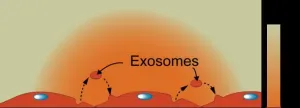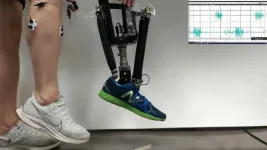(Press-News.org) UMass Amherst Engineering Professor Is Awarded $1.9 Million to Push the Bounds of Cancer, Heart Disease Research
Jinglei Ping will explore a new method of controlling cell communication by electronically regulating exosome traffic through the National Institutes of Health grant
AMHERST, Mass. — The human body is a sophisticated organism that has complex internal communication systems down to a cellular level. However, these systems transmit more than just messages about healthy human functions; they can also influence disease.
Consider cancer. Jinglei Ping poses the question: “How do unhealthy cells transport their own cancer information to the nearby cells to have the tumor grow and finally turn into cancer?” More importantly, can the conversation be controlled to stop the disease?
Ping, an assistant professor of mechanical and industrial engineering at the University of Massachusetts Amherst, with an adjunct role in biomedical engineering and affiliation with the Institute for Applied Life Sciences, will use his $1.9 million, five-year grant to attempt to answer these questions.
The Maximizing Investigators’ Research Award from the National Institutes of Health will support Ping’s investigation into a new way to manipulate cell communication, with implications for developing therapeutics to treat cancer and heart disease.
One way cells “talk” to their neighbors is by passing small particles called exosomes. “Exosomes are very small ‘bubbles’ generated by cells and the bubbles deliver important molecules, like RNA or small pieces of DNA, from one cell to another,” Ping explains.
However, this mechanism can also explain the spread of disease within the body. “Exosome release is related to the growth of tumor cells and how tumors become cancer,” he says. Similarly, cells that control the heartbeat, known as cardiomyocytes, are also influenced by exosome traffic, with implications for heart disease.
By controlling the exosomes, new therapies may be possible, and Ping wants to use pH, which represents the concentration of hydrogen ions in a substance, to connect the dots. “Exosome traffic controls the signal of the cells—they are the cell messengers,” he says. “And the traffic can be controlled by the pH, so the question is: How can we control pH precisely?”
Current chemical methods of changing the pH in a cell’s environment rely on diffusion, which has two major drawbacks. First, it’s not targeted, so you can’t pinpoint which cells you want to affect. And it’s slow—it may take hours to diffuse into the cell and make changes. “You have no idea when the cell actually started to respond to the pH variation because you cannot control the delivery of hydrogen ions,” he explains.
Adding an acid or a base to a solution isn’t the only way to change its pH—Ping has demonstrated that this can also be accomplished by passing a well-controlled electric current through it. With this grant, Ping aims to further develop an array of microelectrodes, each creating its own pH microenvironment, to regulate exosome-based communications between cell clusters at highly precise locations. “It changes it from a chemical process to an electronic process so it’s quick and it’s controllable.”
He says that there are many important applications of this work. “It could be very useful, for example, to view new phenomenon in biology, shed light on tissue engineering and also drug delivery.” With this in mind, his research will focus on developing this method of controlling exosomes specifically for tumor cells and cardiomyocytes.
Contact:
Jinglei Ping ping@engin.umass.edu
Julia Westbrook jwestbrook@umass.edu
END
UMass Amherst engineering professor is awarded $1.9 million to push the bounds of cancer, heart disease research
Jinglei Ping will explore a new method of controlling cell communication by electronically regulating exosome traffic through the National Institutes of Health grant
2023-10-18
ELSE PRESS RELEASES FROM THIS DATE:
American Society of Anesthesiologists names Ronald L. Harter, M.D., FASA, new president
2023-10-18
SAN FRANCISCO — Ronald L. Harter, M.D., FASA, professor of anesthesiology in the Department of Anesthesiology at The Ohio State University Wexner Medical Center in Columbus, was today named president of the American Society of Anesthesiologists (ASA), the nation’s largest organization of physician anesthesiologists. Dr. Harter assumed office at the ANESTHESIOLOGY® 2023 annual meeting and will serve for one year.
“ASA is the premier educational, research and scientific organization representing anesthesiology in the U.S., and I’m honored to have this opportunity to advance ...
Study finds increased risk of Guillain-Barré after COVID-19 infection
2023-10-18
EMBARGOED FOR RELEASE UNTIL 4 P.M. ET, WEDNESDAY, OCTOBER 18, 2023
MINNEAPOLIS – Having a COVID-19 infection is associated with an increased risk of developing the rare disorder called Guillain-Barré syndrome within the next six weeks, according to a study published in the October 18, 2023, online issue of Neurology®, the medical journal of the American Academy of Neurology. The study also found that people who received the mRNA vaccine from Pfizer-BioNTech were less likely to develop the ...
Protecting polar bears aim of new and improved radar technology
2023-10-18
Research testing new technology to more effectively locate polar bear dens across the Arctic is showing promising results. Researchers from Simon Fraser University and Brigham Young University (BYU), collaborating with Polar Bears International, hope that improving detection tools to locate dens—which are nearly invisible and buried under snow—will help efforts to protect mother polar bears and their cubs.
Results of a pilot study aimed at improving den location in Churchill, Manitoba—using ARTEMIS Inc., an imaging system that relies on Synthetic Aperture Radar, or SAR—are published this week ...
From one nightmare to another. Anthony Fauci’s new concern
2023-10-18
(WASHINGTON) -- “What keeps you up at night?”
It’s a question Anthony Fauci, MD, heard repeatedly over the course of his nearly four decades as director of the National Institute of Allergy and Infectious Diseases at the National Institutes of Health.
Now a Distinguished University Professor at Georgetown University School of Medicine and the McCourt School of Public Policy, Fauci says he realized his worst nightmare -- a twist on the usual question -- in January 2020 when the type of virus he most feared triggered a worldwide pandemic.
Today, as the COVID-19 pandemic wanes, Fauci describes a new nemesis ...
Robotic prosthetic ankles improve ‘natural’ movement, stability
2023-10-18
Robotic prosthetic ankles that are controlled by nerve impulses allow amputees to move more “naturally,” improving their stability, according to a new study from North Carolina State University and the University of North Carolina at Chapel Hill.
“This work focused on ‘postural control,’ which is surprisingly complicated,” says Helen Huang, corresponding author of the study and the Jackson Family Distinguished Professor in the Joint Department of Biomedical Engineering at NC State and UNC.
“Basically, when we are standing still, ...
New study suggests promising approach for treating pancreatic cancer
2023-10-18
A new study carried out in mice, led by Queen Mary University of London, has identified cells that drive the spread of pancreatic cancer and discovered a weakness in these cells that could be targeted using existing drugs. This offers a promising new approach for treating pancreatic cancer.
The research, published in Science Advances and funded by Barts Charity and Cancer Research UK, found that many patients' pancreatic cancer contains cells called amoeboid cells. These are aggressive, invasive ...
The encounter between Neanderthals and Sapiens as told by their genomes
2023-10-18
About 40,000 years ago, Neanderthals, who had lived for hundreds of thousands of years in the western part of the Eurasian continent, gave way to Homo sapiens, who had arrived from Africa. This replacement was not sudden, and the two species coexisted for a few millennia, resulting in the integration of Neanderthal DNA into the genome of Sapiens. Researchers at the University of Geneva (UNIGE) have analyzed the distribution of the portion of DNA inherited from Neanderthals in the genomes of humans (Homo sapiens) ...
Migrants in Denmark face disparities in care for type 2 diabetes
2023-10-18
A large, population-wide study of Denmark residents with type 2 diabetes shows that migrants typically face a greater risk of inferior care for their disease than native Danes, particularly when it comes to monitoring their disease and controlling biomarkers—managing blood levels of key substances that are associated with diabetes. Anders Aasted Isaksen of Aarhus University and Steno Diabetes Center Aarhus, Denmark, and colleagues present these findings in the open-access journal PLOS Global Public Health.
Prior research ...
Drought conditions expose rivers to hotter water temperatures
2023-10-18
As climate change warms the planet and droughts are anticipated to become more frequent and extreme, a new study reveals how reduced water flows and rising atmospheric temperatures are set to heat our rivers - creating major challenges for aquatic life, ecosystems, and society.
Water temperature is an important control for all the physical, chemical, and biological processes in rivers. It is particularly important for organisms that cannot regulate their own body temperature, such as fish. River temperature is important for human health and industrial, domestic, and recreational ...
The right to be forgotten: ESMO calls on EU countries to ensure equal financial rights for cancer survivors
2023-10-18
ESMO calls on EU member states to adopt a five-year threshold for cancer survivors’ right to be forgotten when transposing the revised EU Consumer Credits Directive to their national legislation
The Society has been selected as one of the key stakeholders involved in the development of the EU Code of Conduct which seekS to ensure that advances in cancer care are reflected in the commercial practices of financial service providers
The ESMO Patient Advocacy Working Group aims to launch a pan-European campaign to illustrate to decision-makers the life-changing impact of a simple ...
LAST 30 PRESS RELEASES:
Roadmap for Europe’s biodiversity monitoring system
Novel camel antimicrobial peptides show promise against drug-resistant bacteria
Scientists discover why we know when to stop scratching an itch
A hidden reason inner ear cells die – and what it means for preventing hearing loss
Researchers discover how tuberculosis bacteria use a “stealth” mechanism to evade the immune system
New microscopy technique lets scientists see cells in unprecedented detail and color
Sometimes less is more: Scientists rethink how to pack medicine into tiny delivery capsules
Scientists build low-cost microscope to study living cells in zero gravity
The Biophysical Journal names Denis V. Titov the 2025 Paper of the Year-Early Career Investigator awardee
Scientists show how your body senses cold—and why menthol feels cool
Scientists deliver new molecule for getting DNA into cells
Study reveals insights about brain regions linked to OCD, informing potential treatments
Does ocean saltiness influence El Niño?
2026 Young Investigators: ONR celebrates new talent tackling warfighter challenges
Genetics help explain who gets the ‘telltale tingle’ from music, art and literature
Many Americans misunderstand medical aid in dying laws
Researchers publish landmark infectious disease study in ‘Science’
New NSF award supports innovative role-playing game approach to strengthening research security in academia
Kumar named to ACMA Emerging Leaders Program for 2026
AI language models could transform aquatic environmental risk assessment
New isotope tools reveal hidden pathways reshaping the global nitrogen cycle
Study reveals how antibiotic structure controls removal from water using biochar
Why chronic pain lasts longer in women: Immune cells offer clues
Toxic exposure creates epigenetic disease risk over 20 generations
More time spent on social media linked to steroid use intentions among boys and men
New study suggests a “kick it while it’s down” approach to cancer treatment could improve cure rates
Milken Institute, Ann Theodore Foundation launch new grant to support clinical trial for potential sarcoidosis treatment
New strategies boost effectiveness of CAR-NK therapy against cancer
Study: Adolescent cannabis use linked to doubling risk of psychotic and bipolar disorders
Invisible harms: drug-related deaths spike after hurricanes and tropical storms
[Press-News.org] UMass Amherst engineering professor is awarded $1.9 million to push the bounds of cancer, heart disease researchJinglei Ping will explore a new method of controlling cell communication by electronically regulating exosome traffic through the National Institutes of Health grant


